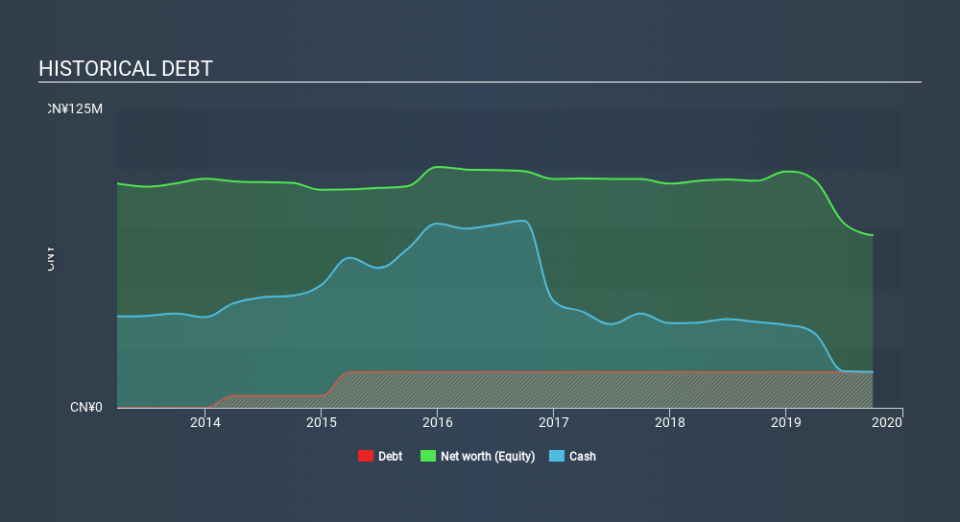Does Pharmesis International (SGX:BFK) Have A Healthy Balance Sheet?

The external fund manager backed by Berkshire Hathaway's Charlie Munger, Li Lu, makes no bones about it when he says 'The biggest investment risk is not the volatility of prices, but whether you will suffer a permanent loss of capital. So it seems the smart money knows that debt - which is usually involved in bankruptcies - is a very important factor, when you assess how risky a company is. We note that Pharmesis International Ltd. (SGX:BFK) does have debt on its balance sheet. But the real question is whether this debt is making the company risky.
When Is Debt Dangerous?
Generally speaking, debt only becomes a real problem when a company can't easily pay it off, either by raising capital or with its own cash flow. Part and parcel of capitalism is the process of 'creative destruction' where failed businesses are mercilessly liquidated by their bankers. However, a more common (but still painful) scenario is that it has to raise new equity capital at a low price, thus permanently diluting shareholders. Of course, plenty of companies use debt to fund growth, without any negative consequences. The first thing to do when considering how much debt a business uses is to look at its cash and debt together.
See our latest analysis for Pharmesis International
What Is Pharmesis International's Debt?
You can click the graphic below for the historical numbers, but it shows that as of September 2019 Pharmesis International had CN¥15.0m of debt, an increase on CN¥15.0, over one year. However, its balance sheet shows it holds CN¥15.1m in cash, so it actually has CN¥108.0k net cash.
A Look At Pharmesis International's Liabilities
The latest balance sheet data shows that Pharmesis International had liabilities of CN¥23.8m due within a year, and liabilities of CN¥944.0k falling due after that. Offsetting this, it had CN¥15.1m in cash and CN¥25.5m in receivables that were due within 12 months. So it actually has CN¥15.9m more liquid assets than total liabilities.
This surplus strongly suggests that Pharmesis International has a rock-solid balance sheet (and the debt is of no concern whatsoever). On this view, lenders should feel as safe as the beloved of a black-belt karate master. Simply put, the fact that Pharmesis International has more cash than debt is arguably a good indication that it can manage its debt safely. There's no doubt that we learn most about debt from the balance sheet. But it is Pharmesis International's earnings that will influence how the balance sheet holds up in the future. So when considering debt, it's definitely worth looking at the earnings trend. Click here for an interactive snapshot.
Over 12 months, Pharmesis International made a loss at the EBIT level, and saw its revenue drop to CN¥42m, which is a fall of 38%. To be frank that doesn't bode well.
So How Risky Is Pharmesis International?
Statistically speaking companies that lose money are riskier than those that make money. And in the last year Pharmesis International had negative earnings before interest and tax (EBIT), truth be told. And over the same period it saw negative free cash outflow of CN¥5.2m and booked a CN¥7.2m accounting loss. But the saving grace is the CN¥108.0k on the balance sheet. That means it could keep spending at its current rate for more than two years. Overall, its balance sheet doesn't seem overly risky, at the moment, but we're always cautious until we see the positive free cash flow. When analysing debt levels, the balance sheet is the obvious place to start. However, not all investment risk resides within the balance sheet - far from it. Take risks, for example - Pharmesis International has 4 warning signs (and 3 which don't sit too well with us) we think you should know about.
At the end of the day, it's often better to focus on companies that are free from net debt. You can access our special list of such companies (all with a track record of profit growth). It's free.
If you spot an error that warrants correction, please contact the editor at editorial-team@simplywallst.com. This article by Simply Wall St is general in nature. It does not constitute a recommendation to buy or sell any stock, and does not take account of your objectives, or your financial situation. Simply Wall St has no position in the stocks mentioned.
We aim to bring you long-term focused research analysis driven by fundamental data. Note that our analysis may not factor in the latest price-sensitive company announcements or qualitative material. Thank you for reading.

